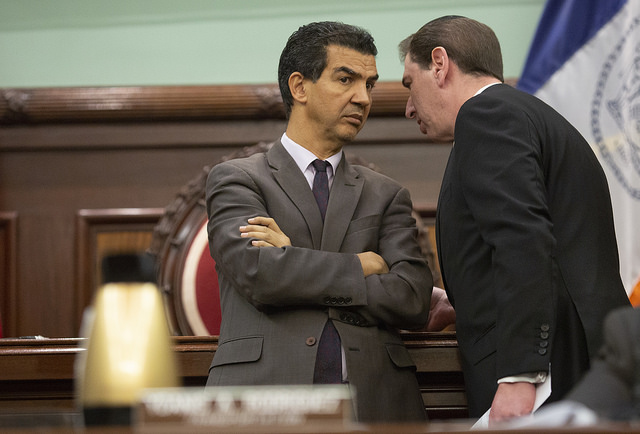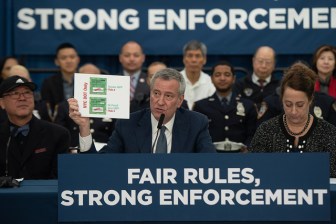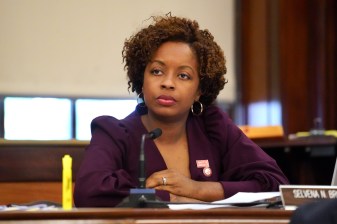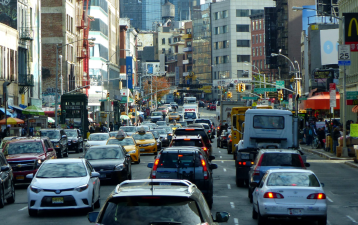Who Replaced the Council’s Transportation Committee with Pro-Car Zombies?
Under Council Speaker Corey Johnson, the committee has returned to the bad-old-days of parochial parking complaints and disregard for the car-free majority.

They should probably starting calling it the Car Storage Committee.
Under Speaker Corey Johnson, the City Council Transportation Committee has devolved from a panel devoted to addressing complex transportation challenges into one narrowly devoted to relaxing the rules governing curbside access for the city’s car-owning minority.
That phenomenon was on full display at Monday’s oversight hearing on parking regulations, which focused almost entirely on having them regulate less.
One by one, council members attempted to micromanage how the city enforces parking rules: One proposal would excuse drivers from paying for parking if the time they pay extends past the time meters are no longer in effect. Another bill would wave parking violations if the violator could prove the parking sign was illegible. Others would suspend Alternate Side Parking regulations on Three Kings Day and Lunar New Year’s Eve.
“Sometimes, [parking] regulations can become too burdensome and outdated,” committee Chairman Ydanis Rodriguez said in his opening statement. “Many of them are old and must be modified, which is why we are here having this hearing today.”
Coming from Rodriguez, who called for dynamic, market-based parking meter rates when the city unveiled its pay-by-app system two years ago, one might expect the committee would delve into questions about the over-saturation of the curb. The committee might even touch on Rodriguez’s push to implement residential parking permits.
Not so.
Missing from the hearing was any discussion of the impacts that New York City’s low parking fees have on safety, congestion, or the economy. The Department of Transportation’s recent decision to increase meter rates across the city — a strategy to increase turnover and reduce congestion — also got no mention.
Instead, council members spent the hearing fighting to defend their “right” to on-street car storage, which occupies enough space to fill 16 Central Parks, according to Transportation Alternatives.
Most of their energy went to blasting the Sanitation Department for not wanting to add more days with Alternative Side Parking suspensions, which they saw as an outcome of the lack of Asian-Americans and Latinos in city leadership. On multiple occasions, they drifted from the agenda to harp on the DOT reps for parochial parking concerns on specific blocks in their districts.
.@KalmanYeger bemoans the fact that @NYC_DOT's commissioner isn't here. "She's probably painting another bus lane in my district," he says. To hell with bus riders.
— David J. Meyer (@dahvnyc) October 29, 2018
Some valuable bills were on the agenda, including one from Council Member Costa Constantinides requiring DOT to come up with a strategy for overnight commercial deliveries. But Constantinides’s more important parking-related bill, which would eliminate a city program that reduces parking fines for delivery companies, was not addressed.
The two pedestrian-focused bills discussed, meanwhile, had nothing to do with parking.
It was the second such hearing of the year, after a similar car storage-focused meeting in June, and a sharp turn from how Rodriguez ran the committee under Johnson’s predecessor, Melissa Mark-Viverito.
In the previous term, Rodriguez and his colleagues used the committee to expose the city’s hit-and-run crisis, to push for Citi Bike expansion, to protect cyclists and pedestrians, and to explore new policy frontiers like car-sharing or autonomous vehicles.
In 2018, the transportation committee has more in common with its time under Rodriguez’s predecessor, Jimmy Vacca, who used his bully pulpit from 2010 to 2013 to rail against pedestrian plazas, bike lanes, and marginal meter hikes.
DOT, to its credit, resisted the pro-parking onslaught on Monday. The administration refused to endorse any of the bills put forward, although it said it was open to working with the council on overnight deliveries.
“The purpose of parking meters is to turn parking over — to make that parking available to more and more customers and not to have someone monopolize a parking space for the entire day,” DOT Deputy Commissioner for Traffic Operations Josh Benson explained to reporters after his testimony.



